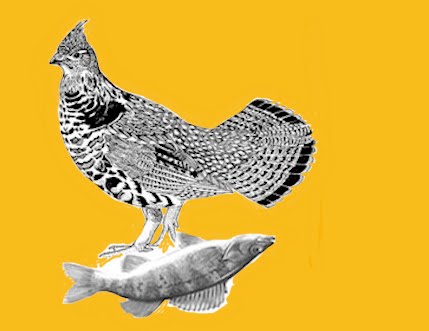
This morning CBC is featuring a news item about a Canadian federal government contract to put a dollar figure on the worth of polar bears.The precipitant is the consideration of polar bears for designation under our Species at Risk Act (SARA). I find it odd that this has come up for so emblematic and, as the lingo goes, charismatic a species as the big whites given that the list of endangered species currently includes a multiplicity of hitherto unheard of creatures which even the most eco-sympathetic and creative economist would have trouble ascribing money value to. For in addition to such zoological shoo-ins as the Grizzly and the Grey Whale, presently, Canada has listed the Pygmy Short-Horned Lizard, the Dwarf Wedge Mussel and the Pacific Water Shrew on the top priority ledger - Schedule I qualifiers. It would be superficially entertaining to see the economic rationale for these or for plants like the Illinois Tick-trefoil or the Incurved Grizzled Moss, both also on the list of priority designation.
I say "superficially" because superficial is exactly what this preposterous economic study is now underway by a Quebec firm, ÉcoRessources. CBC's commentators are reporting the analysis as if this is some vanguard hitherto unseen creative methodology when, in fact, it is nothing of the sort.
 During one of the last century's several pulses of environmentalism, in the late 1960s and 1970s, economic busy-minds, anxious to be part of the vogue for environmental impact assessment, clunky calculators at the ready, started turning up all over the place with data-rich evaluations that put dollar values not only on species but entire valued ecosystems. A new sub-discipline replete with own journals and internecine methodological controversies emerged - "ecological economics". yet this was itself, only a johnny-come-lately to work such as the venerable Resources for the Future and the less venerated US Army Corps of Engineers had been doing for years, busily tallying up the worth of nature, often merely as part of the due diligence for planning and implementing ecocidal mega-projects.
During one of the last century's several pulses of environmentalism, in the late 1960s and 1970s, economic busy-minds, anxious to be part of the vogue for environmental impact assessment, clunky calculators at the ready, started turning up all over the place with data-rich evaluations that put dollar values not only on species but entire valued ecosystems. A new sub-discipline replete with own journals and internecine methodological controversies emerged - "ecological economics". yet this was itself, only a johnny-come-lately to work such as the venerable Resources for the Future and the less venerated US Army Corps of Engineers had been doing for years, busily tallying up the worth of nature, often merely as part of the due diligence for planning and implementing ecocidal mega-projects. Which brings me to why anyone truly concerned about polar bears or obscure rare mosses should speak out against this hyper-mundane attempt to reduce our caring to the almighty loonie. On the surface, these exercises frequently come up with equally news-catching headlines trumpeting that such and such a species is worth some bigger number of dollars than you and I will ever have to whatever jurisdiction it lives in. For example in an interview on CBC's Daybreak North program today, one of ÉcoRessources' staff gave the example of a Wisconsin assessment that valued the state's bald eagles at a whopping $28 million dollars. Our local CBC interviewer seemed impressed: but pause and think about just how small a destructive project which may threaten those eagles would have to be to score higher. A mid-sized port dredging project or the extension of the Green Bay airport runway could easily boast discounted future benefits that kicked eagle ass. My point is that it is exceptionally dangerous to concede to the economic frame of mind the methodology by which evaluation of real value is to occur.
Thirty-five years ago, the traditional indigenous peoples of the Mackenzie Valley, in dialogue with Justice Thomas Berger, demonstrated a very different way of taking measure of nature's services. They turned up at countless small community workshops and told Justice Berger why bears and everything else that interacts with them are precious beyond the transitory benefits derivable by pumping hydrocarbons south. Their "metrics' were of the heart and, with Berger's excellent rapporteur-ship, those evaluations provided a durable protective cover for lands and creatures we need and we value way beyond dollars. It would seem from yesterday's news that most though not all of the Native people along the planned pipeline corridor have been won - or should I say "bought"? - over to a more "realistic," contemporary mind set, i.e. take the money today and damn the consequences to that once-vaunted seventh generation in the future. Or as an academic paper by a very wise and now late economic historian, Robert Heilbroner wryly asked "What has posterity ever done for me?"

Well before even Berger or Heilbroner, one of the founding fathers of environmentalism took on early ecological number crunchers with his beautiful and brilliant plea for a land ethic. Back in 1948 he confronted the trend even then to quantify the value of species and environments in these words, well worth reflecting on as our philistine government and its analytical handmaidens pore through the dollar figures on our magnificent and declining polar bears:
When the logic of history hungers for bread and we hand out a stone, we are at pains to explain how much the stone resembles bread. I now describe some of the stones which serve in lieu of a land ethic.
One basic weakness in a conservation system based wholly on economic motives is that most members of the land community have no economic value. Wildflowers and songbird are examples. Of the 22,000 higher plants and animals native to Wisconsin, it is doubtful whether more than 5 per cent can be sold, fed, eaten, or otherwise put to economic use Yet these creatures are members of the biotic community, and if (as I believe) its stability depends on its integrity they are entitled to continuance.
When one of these non-economic categories is threatened and if we happen to love it, we invent subterfuges to give it economic importance. At the beginning of the century song birds were supposed to be disappearing. Ornithologists jumped to the rescue with some distinctly shaky evidence the effect that insects would eat us up if birds failed to control them. The evidence had to be economic in order to be valid.
It is painful to read these circumlocutions today. We have no land ethic yet, but we have at least drawn nearer the point of admitting that birds should continue as a matter of biotic right, regardless of the presence or absence of economic advantage to us.
 This profound insight and the ethic upheld by Leopold are what ought to underlie the stewardship Canadians and others get behind including the belated and so obviously needed designation of the polar bears - lest otherwise they exist in animatronic Coke commercials or in the windows of museums.
This profound insight and the ethic upheld by Leopold are what ought to underlie the stewardship Canadians and others get behind including the belated and so obviously needed designation of the polar bears - lest otherwise they exist in animatronic Coke commercials or in the windows of museums.








